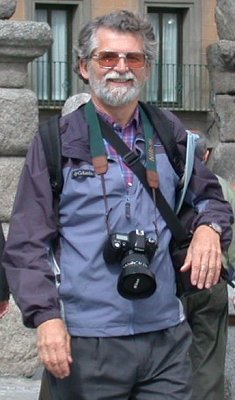home | internet service | web design | business directory | bulletin board | advertise | events calendar | contact | weather | cams

Cuba, Havana and Trinidad Excerpt from Bill Hottell's Unpublished Memoir When Diana asked me where I wanted to celebrate my upcoming sixtieth birthday, she was taken aback when I Immediately replied, “Cuba!” So in December of 1998 we found ourselves in Old Havana, one of the most fascinating and “foreign” places I had ever seen. It was like taking a time machine back to an eighteenth century Spanish colonial town. Old Havana still boasts of hundreds of historic buildings, of colonial era churches, stately mansions and public buildings. And permeating everything is the presence of Fidel Castro. For lodging we stayed in the former mansion of a plantation owner, the eighteenth century Hostal Valencia, decorated with brightly colored Spanish tiles, as well as the pink and elegant Hotel Ambos Mundos where Ernest Hemingway lived through much of the 1930’s. From Havana we rode a slow bus to the south coast of Cuba to the historic town of Trinidad which had served as the principal port of entry for African slaves in the eighteenth and nineteenth centuries. While swimming in the turquoise-green waters of Trinidad, we spotted a single, lone hotel standing all by itself far down the coast, so we strolled along the beach to get a closer look at the deluxe hotel. We walked inside, sat in easy chairs in the open-air lobby and savored the tropical atmosphere of the palm trees, pink hibiscus and red bougainvillea. Then I started observing the hotel guests who were mostly North Koreans and Chinese. Evidently these guests were the commissars and apparatchiks, the elite of what was left of the Communist world, taking a privileged vacation here in Fidel Castro’s Cuba. Indeed, “Some animals are more equal than others.” I felt very pleased that we were able to find and penetrate such a alien place, to slip into an inner sanctum of the Communist world. I felt like a master of mystery and intrigue. Mark Twain could never have guessed what influence he would exercise over readers in the far future. He would entice this adventure-seeker into the mysterious world of Castro’s Cuba. After another long bus ride across Cuba over roads almost totally empty of busses and cars, we pulled into the Havana bus station after dark. We had no place to stay for the night, so I was glad to see a mob of people standing around the bus door begging us passengers to come and stay in their homes (all the passengers were Cubans except the two of us). By design I surveyed the crowd and observed that nearly all of them were waving their arms energetically and pleading with us to choose them. Then I noticed a dignified couple standing calmly at the back edge of the crowd. So we struggled through the shouting throng, approached the quiet couple, and we did spend the night with them. Ernesto and Margarita led us from the bus station to their drab, Soviet-style high-rise on Tulipan Street. We climbed up the stairs to their fourth floor apartment because the elevator did not work all the time. The two of them were so anxious to learn about us and our life in America that we talked for many hours far into the night. For me it is exhausting to speak a foreign language for hours and the Spanish of Cuba is more difficult than that of Mexico or Columbia. So it was a very draining evening. And again I admired Diana’s facility with languages. She can speak half a dozen languages with a nearly perfect accent. Our hosts turned out to be exceedingly interesting. They were both devoted members of the Communist Party. Margarita had worked as a volunteer in 1960 when Castro sent out his first wave of zealous teachers to educate the nearly illiterate nation and elevate the literacy level to an astonishing height. She spent that first winter in a squalid “school” in the wet and freezing Sierra Maestra Mountains above Santiago de Cuba. Now she felt a deep pride in her contribution to the education successes of Castro’s Communist regime. Ernesto, on the other hand, was an economist who served in the higher echelons of the Communist government from the very beginning and had actually worked with Che Guevara in the Ministry of Finance in the early 1960’s. He was still working as an economist in the government today. At the end of the intriguing and exhausting evening, while I was washing in the bathroom I noticed their toothbrush. The bristles were flattened out in a brush that had been totally worn out about twenty years ago. I stood flabbergasted, but then remembered that Cuba had been under a United Nations embargo as well as a U.S. embargo for nearly forty years. There were no tooth brushes for sale in Cuba. There were virtually no other consumer goods available in Cuba. Diana and I decided to send Margarita and Ernesto some tooth brushes from home, but soon realized that they could get into serious trouble in a totalitarian police state if they received a package from the U.S.A. For me it was the highest honor to have spent an evening with such a wonderful couple. Ernesto and Margarita had made us feel welcome in their modest home, made us feel like insiders in the Communist regime of Castro’s Cuba.
|
